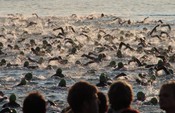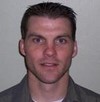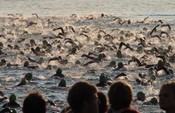You may have never heard of a triathlon. Or perhaps you’re a veteran triathlete. The purpose of this article isn’t necessarily to convince you to compete in a triathlon – although it is a great cross-training sport and I highly recommend it! Rather, it is to encourage you to set fitness goals and stick to them. Physical fitness is an extremely important aspect of our wellbeing, and it is something we have to work harder at in today’s electronic have-it-all-right-now world. Likewise, it is an encouragement to set goals in your Christian walk, and stick with them. And, as you set goals – both in your spiritual and fitness walk – aim high. Too often we settle for mediocrity, when God tells us that He (not me!) is able to do “immeasurably more than all we ask or imagine” (Eph. 3:12)! Imagine that! Are you aiming high enough? I hope this article serves as an encouragement to you. – Michael Pluimer
 “A sprint triathlon? What’s that?” I asked my spotter, Curt, after we finished our set on the bench. “Oh, it’s just a shorter distance triathlon,” he replied. “You swim around a quarter-mile, then bike anywhere from 10 – 15 miles, and run 3 – 4 miles. I’ve been racing them for about 3 years now. It’s a blast. You should give it a try!” As he headed down to the pool and I to the basketball court, I thought it sounded kind of fun. Too bad I couldn’t swim.
“A sprint triathlon? What’s that?” I asked my spotter, Curt, after we finished our set on the bench. “Oh, it’s just a shorter distance triathlon,” he replied. “You swim around a quarter-mile, then bike anywhere from 10 – 15 miles, and run 3 – 4 miles. I’ve been racing them for about 3 years now. It’s a blast. You should give it a try!” As he headed down to the pool and I to the basketball court, I thought it sounded kind of fun. Too bad I couldn’t swim.
As the summer went on, I kept running into Curt. Every time I saw him, I thought about the sprint triathlon. I knew I had to give it a shot. On July 15, 2000, I asked Curt if there were any races coming up in the fall. He said the only one left that summer was on August 4 in Duluth, MN. Perfect. That gave me 3 weeks to learn how to swim!
The race consisted of a 600-yard swim, followed by a 10.5-mile bike and a 2.5-mile run. I had a fairly solid running base, but had to dust off my old mountain bike and quickly learn how to swim. But it was just a 600-yard swim. In golf terms, all I had to do was swim to my tee shot and back. How hard could that be? Stupid question. My first time in the pool, I didn’t even make it to the other wall – just 25 yards away – without resting on the side of the pool! The next 2 weeks consisted of crash course swimming lessons and some time on the rusty mountain bike. By August 4, I could successfully swim 600 yards without stopping (albeit a mix between the crawl and the backstroke). I’d be just fine as long as the swim course was truly 600 yards and the lake water fairly calm.
As my wife and I pulled up to the race in the early morning, I felt a bit out of place. My soccer shorts and tee shirt didn’t seem to match the spandex attire of the rest of the racers, and a trade between my car and one of their bikes would have resulted in me still throwing in a thousand bucks. What was I doing here? As we made our way down to the beach, my wife and I were unable to spot the turnaround buoy on the swim course. This was partly because it was twice as far as it was supposed to be, and partly because it was covered in whitecaps on account of the 20 mph winds coming right into our face! So much for the calm waters and short course.
I came out of the water 224th out of 258 racers. But the important part is the first three words of that sentence: I came out! I did fairly well on the bike, considering it was an old rattle trap mountain bike, and then gained some ground on the run to finish 146th overall. But I finished! And I was hooked. At the time, I couldn’t even fathom that just 3 seasons later I would complete my first Ironman Triathlon – a 2.4 mile swim, followed by a 112 mile bike, and a 26.2 mile marathon run – and later on win my first sprint triathlon against 300 racers, and my life would be transformed by the sport.
The Ironman Triathlon is in a league of its own. No other race really compares. However, all the different distance triathlons are great for physical fitness. Sprints are fun, and a great way to get started in the sport. Olympic distance triathlons are more challenging, and many consider them the perfect distance. Half Ironman triathlons are about perfect for me – a good mix of endurance and speed. A full Ironman is perfect… for about half of it! It is a grueling race that must be experienced to be fully appreciated. However, the race is not for everyone. I have as much respect for the short course triathletes as the long course – they are just a different breed, and they just endure a different type of pain.
When I made the leap to Ironman distance triathlons, I knew it came with a price. As a family man, I didn’t want to sacrifice my family for the sake of what seemed like a rather self-serving sport. How could I justify spending 12 hours per week training? And that was the bare minimum, according to all the triathlon-training articles I had read. My priorities were very clear: Faith, Family, Others, and Self – in that order. How could triathlon fit into that mix? Yet I had a goal to finish an Ironman triathlon. And I have always felt that God wants us to set big goals, so He can show us how big He is. After much prayer and discussion with my wife, we agreed that I would do one, and then I could check it off my list of goals. (Although she later would say that she knew at that moment that it wouldn’t be just one).
In June, I will be racing in my 6th Ironman triathlon, with dozens of other races under my belt – from sprints to half Ironmans, 5 K’s to marathons. The sport has really transformed my life, and I’d encourage you to contemplate a new physical fitness goal and go for it. The rewards are worth the risk. Triathlon and racing have taught me discipline, determination, and dedication – not only in my physical training and racing, but also in my spiritual walk and other aspects of my life. 1 Timothy 4:7-8 says, “…train yourself to be godly. For physical training is of some value, but godliness has value for all things, holding promise for both the present life and the life to come.” The discipline that is required to compete in Ironman triathlons has also taught me to be disciplined in other areas of my life – areas far more important that the Ironman. I’m confident you will see similar results, if you just take the plunge into your fitness goals.
- Set a goal. As a beginner triathlete, my goal was just to finish the race. But it was critical to have a goal. Without a goal, we have no direction. In your physical and spiritual fitness pursuits, make sure you set a goal. Paul says in 1 Corinthians 9:26 that he does not “run like a man running aimlessly… or fight like a man beating the air”. Rather, he sets a goal and pursues it, as should we in our pursuits.
- Aim high. We will never know how much God can accomplish through us unless we aim higher than we think we can reach. Ephesians 3:20 says “Now to him who is able to do immeasurably more than all we ask or imagine, according to his power that is at work in us…” See, it’s God’s power that works through us, not our power. God’s power is without limits, and often the limits we place on ourselves don’t factor in God’s power. Aim high, and see what God can accomplish. I never imagined I could complete an Ironman Triathlon. But God can do immeasurably more than we can imagine.
- Give God the Glory! It’s not about you. It’s about God, and glorifying him. He has given you gifts and talents, and it is your responsibility to use those gifts so that He may be glorified. Ephesians 3:21 completes the verse quoted above by saying that God’s power is at work in us so that he may be glorified “in the church and in Christ Jesus throughout all generations.” God deserves all the glory for the goals that you accomplish.
- Discipline. Competing in triathlons involves discipline. I typically wake up before 4:00 a.m. and ride my bike to work 21 miles. Rather than taking a traditional lunch break, I go for a run or a swim. I then bike home after work another 21 miles. This schedule requires discipline, but it is the most efficient way to get in my training without sacrificing my family or my work. Be disciplined in both your physical and spiritual training. If that means waking up 30 minutes earlier than normal to go for a walk or run or have time with God, do it. If that means turning off the radio on your way to work so you can pray, do it. It may take discipline, but any goal worth accomplishing requires discipline.
- Rest. Even a triathlete needs rest. Rest is something that God incorporated into his creation, demonstrating this to us by resting on the 7th day. Work hard to accomplish your goals, but don’t be afraid to rest. Any weight trainer knows not to work hard the same muscle group two days in a row. The muscles need a day of rest to recover. Your body needs rest, and God built it into his creation.
But pursue your fitness goals with caution, making sure not to let the sport become an idol in your life. Again, I’m speaking from experience. As I competed in Ironmans, pursuing a sport I loved, something still didn’t seem quite right. There was a feeling of guilt – the hours spent training could certainly be better used for something else. I was taking care of myself physically, my spiritual life was good, and my family and career weren’t suffering a lack of attention, yet I still felt selfish and self-serving. It was either give up the sport or figure out a way to make it serve a greater purpose. And that’s when the Janus Charity Challenge entered the picture.
The Janus Charity Challenge is a wonderful program that Janus, a sponsor of the North America Ironman events, started. Basically, they encourage participating athletes to use the Ironman to raise funds for any non-profit organization they wish. In return, Janus will award $10,000 to the charity of the athlete who raises the most money. Second place receives $8,000, third $6,000 etc. Each of the top 30 fund-raisers receive some monetary bonus for their charity from Janus. The Janus Charity Challenge became the key that would transform this self-serving sport of mine into something that would serve a greater purpose. In the last 4 Ironman triathlons, we’ve been able to raise over $573,000 for various non-profit organizations such as my local Christian school and crisis pregnancy center, and have received additional bonuses from Janus totaling $32,000. Over $600,000 raised for these non-profits! Praise God!
What has this done? Well, it’s removed the focus from myself and placed it directly on God – the one who deserves all the praise. By competing on behalf of these non-profit organizations, the races have become a tool to glorify God. This happens through speaking engagements on behalf of these charitable organizations, as well as letter writing, articles, radio programs, and other promotions. The fund-raising is a tool to draw others to the sport and communicate to them what really drives me: My passion for Jesus Christ and what he has done for me.
So how can you use this sport, or any other athletic racing event, to spark your fitness as well as your faith? Well, it really is quite simple. The first thing you need to do is find a race and sign up! I encourage you to seek out a race that will either benefit a charity that is in line with your passions, or race on behalf of a charity or goal that is close to your heart. Once you set your goal (preferably allow more than 3 weeks to train, especially if it is a triathlon and you don’t know how to swim!), put together a plan to get there. There are numerous beginner-training programs on the Internet for many sports. You can also contact me directly at the website and email address below, as I’d be happy to help. Once you sign up and establish a training program, it’s just a matter of discipline and sticking to it to accomplish your goal. And don’t forget to aim high with your goals! You will be amazed by what God can accomplish through you, so that he may be glorified.
Remember – It is all about God and giving him the glory. My theme verse is Acts 20:24: “However, I consider my life worth nothing to me, if only I may finish the race and complete the task the Lord Jesus has given me—the task of testifying to the gospel of God’s grace.” If that task cannot be accomplished in the sport of triathlon, I best quit.
 Michael Pluimer holds a Master’s Degree in Mechanical Engineering and is currently working as an Engineering Manager in Willmar, MN. He lives near Raymond, MN with his wife Heather and two children, Michael Jr. (8) and Madeline (5). He has competed in dozens of triathlons and running races, including 5 Ironman Triathlons and numerous Half Ironmans and Olympic distance races, and runs a sub-3 hour marathon. He has several speaking engagements each year to various churches, graduations, high schools, and young adult groups. If you’re interested in his speaking or coaching services, you may contact him at Michael.Pluimer@gmail.com or www.crosstrainercoaching.com
Michael Pluimer holds a Master’s Degree in Mechanical Engineering and is currently working as an Engineering Manager in Willmar, MN. He lives near Raymond, MN with his wife Heather and two children, Michael Jr. (8) and Madeline (5). He has competed in dozens of triathlons and running races, including 5 Ironman Triathlons and numerous Half Ironmans and Olympic distance races, and runs a sub-3 hour marathon. He has several speaking engagements each year to various churches, graduations, high schools, and young adult groups. If you’re interested in his speaking or coaching services, you may contact him at Michael.Pluimer@gmail.com or www.crosstrainercoaching.com




